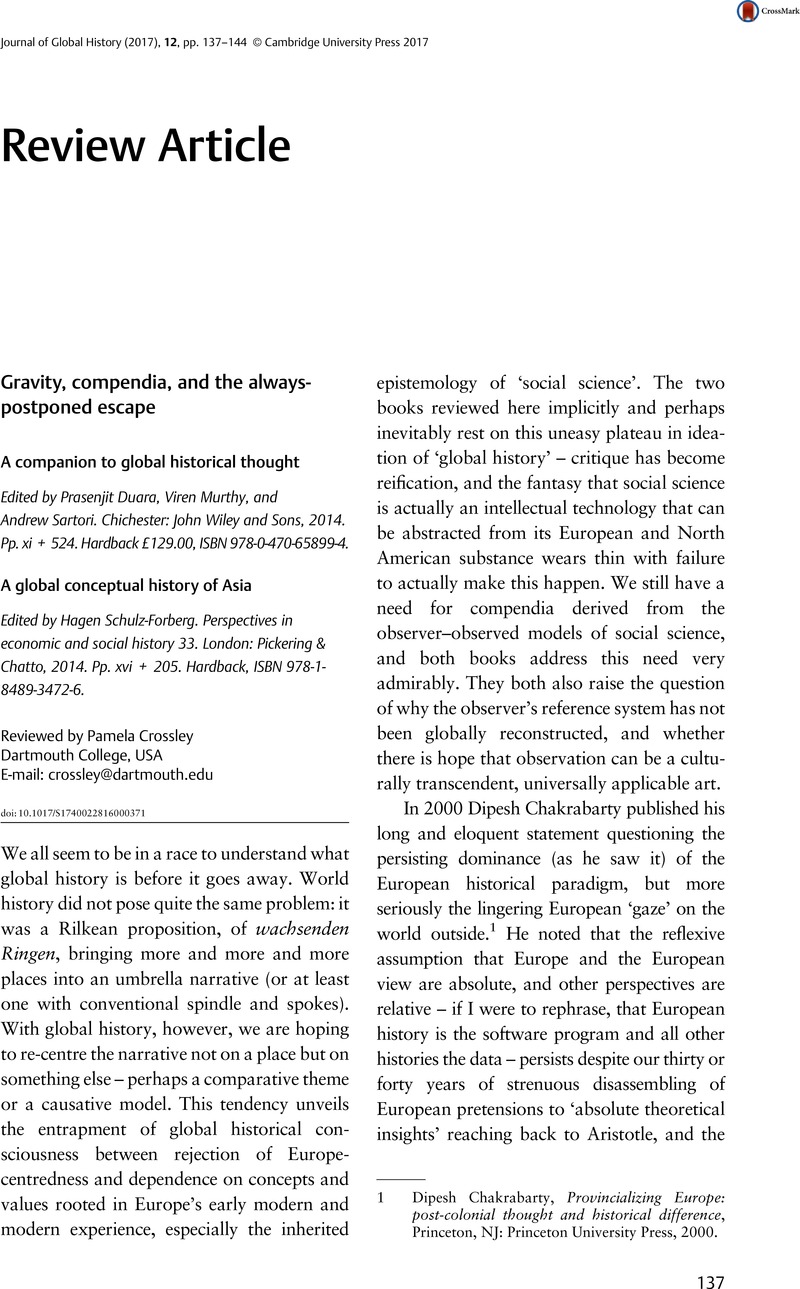No CrossRef data available.
Article contents
Gravity, compendia, and the always-postponed escape
Review products
Published online by Cambridge University Press: 08 February 2017
Abstract

- Type
- Review Articles
- Information
- Copyright
- Copyright © Cambridge University Press 2017
References
1 Chakrabarty, Dipesh, Provincializing Europe: post-colonial thought and historical difference, Princeton, NJ: Princeton University Press, 2000 Google Scholar.
2 Ibid., p. 29, emphasis in original.
3 For background on Wang Fuzhi, see Black, Alison Harley, Man and nature in the philosophical thought of Wang Fu-Chih, Seattle, WA: University of Washington Press, 1989 Google Scholar. For Wang’s putative historiography, see Wright, Kathleen, ‘The fusion of horizons: Hans-Georg Gadamer and Wang Fu-Chih’, Continental Philosophy Review, 33, 3, 2000, pp. 345–358 CrossRefGoogle Scholar; Ssu-yü, Teng, ‘Wang Fu-chih’s views on history and historical writing’, Journal of Asian Studies, 28, 1, 1968, pp. 111–123 Google Scholar. On Gu Yanwu, see Peterson, Willard J., ‘The life of Ku Yen-wu (1613–1682)’, Harvard Journal of Asiatic Studies, 28, 1968, pp. 114–156 CrossRefGoogle Scholar; Santangelo, Paolo, ‘Gu Yanwu’s contribution to history: the historian’s method and tasks’, East and West, 32, 1–4, 1982, pp. 145–185 Google Scholar. A recent essay that has influenced this review is Miranda Brown, ‘Returning the gaze: an experiment in reviving Gu Yanwu (1613–1682)’, Fragments: interdisciplinary approaches to the study of ancient and medieval pasts, 1, 2011, http://hdl.handle.net/2027/spo.9772151.0001.006 (consulted 29 November 2016). For Zhang Xuecheng, see Nivison, David S., The life and thought of Chang Hsüeh-Ch’eng, 1738–1801, Stanford, CA: Stanford University Press, 1966 Google Scholar; Ivanhoe, Philip J., On ethics and history: essay and letters of Zhang Xuecheng, Stanford, CA: Stanford University Press, 2009 CrossRefGoogle Scholar; Mann, Susan, ‘“Fuxue” (Women’s learning) by Zhang Xuecheng (1738–1801): China’s first history of women’s culture’, Late Imperial China, 13, 1, 1992, pp. 40–62 CrossRefGoogle Scholar. For a criticism of apparent modern appropriation of Zhang, facilitated in part by Yü Ying-shih’s reading of parallels to European historical philosophy into Zhang’s writings, see Young-tsu, Wong, ‘Discovery or invention: modern interpretations of Zhang Xuecheng’, Historiography East and West, 2, 2003, pp. 178–203 Google Scholar. Philip Ivanhoe returned to the issue of whether or not Zhang had conceptualized history as a distinct academic discipline in ‘Historical understanding in China and the West: Zhang, Collingwood and Mink’, Philosophy of History, 8, 1, 2014, pp. 78–95.
4 On Rashīd al-Dīn, see Park, Hyunhee, Mapping the Chinese and Islamic worlds: cross-cultural exchange in pre-modern Asia, Cambridge: Cambridge University Press, 2012, pp. 133–144 CrossRefGoogle Scholar; Blair, Sheila S., A compendium of chronicles: Rashid al-Din’s illustrated history of the world, London: Azimuth Editions and Oxford University Press, 1995, p. 13 Google Scholar; Boyle, John Andrew, ‘Rashid al-Din: first world historian’, Iran, 9, 1971, pp. 19–26 CrossRefGoogle Scholar; Krawulsky, Dorothea, The Mongol Ilkhans and their vizier Rashid al-Din, Frankfurt: Peter Lang, 2011, p. 119 Google Scholar. For Ibn Khaldūn, see Issawi, Charles, An Arab philosophy of history: selections from the Prolegomena of Ibn Khaldun of Tunis (1332–1406), London: John Murray, 1950 Google Scholar; Ibn Khaldun, The Muqaddimah: an introduction to history, trans. Franz Rosenthal, 3 vols, 2nd edn, Princeton, NJ: Princeton University Press for the Bollingen Foundation, 1967; Spengler, Joseph J., ‘Economic thought in Islam: Ibn Khaldun’, Comparative Studies in Society and History, 6, 3, 1964, pp. 268–306 CrossRefGoogle Scholar. On historians of later periods, see Cornell H. Fleischer, Bureaucrat and intellectual in the Ottoman empire: the historian Mustafa Âli (1541–1600), Princeton: Princeton University Press, 1986; Bernard Lewis and P. M. Holt, eds., Historians of the Middle East, London: Oxford University Press, 1962; Cornell H. Fleischer and Hakan Karateke, eds., Historians of the Ottoman empire, https://ottomanhistorians.uchicago.edu (consulted 29 November 2016).
5 Dale, Stephen Frederick, The orange trees of Marrakesh: Ibn Khaldun and the science of man, Cambridge, MA: Harvard University Press, 2015 CrossRefGoogle Scholar.
6 Ibid., p. 263.
7 Ibid., p. 261, citing Toynbee, Arnold, A study of history, vol. 3, New York: Oxford University Press, 1962, pp. 321–328 Google Scholar.


